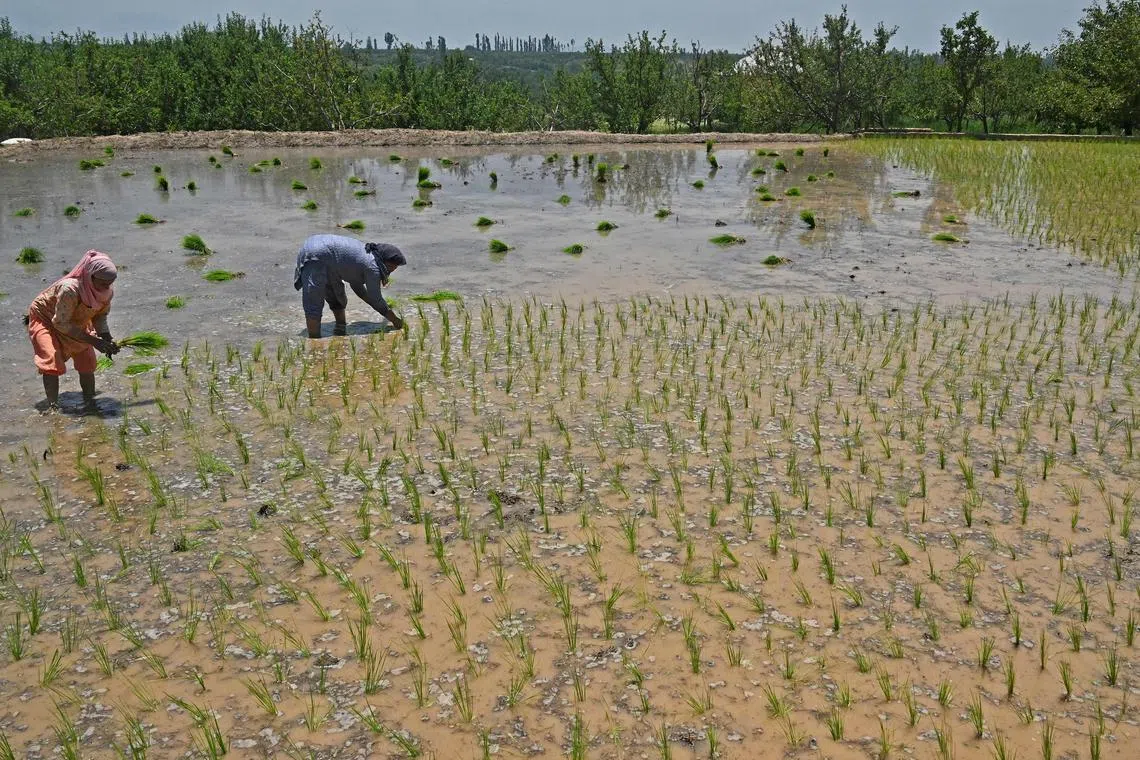PM Modi may give farm handouts as food export bans hit rural India
Sign up now: Get ST's newsletters delivered to your inbox

Economists say Indian PM Narendra Modi needs to act sooner rather than later, given inflation is outpacing incomes in rural areas.
PHOTO: AFP
Follow topic:
NEW DELHI – Prime Minister Narendra Modi may offer handouts to Indian farmers ahead of the elections as food commodity export bans to control inflation begin to hurt incomes and could cost him some votes.
There is already a ban on the export on wheat, and in July, the Modi administration halted the overseas sale of some rice varieties
There is cause for concern. Ruling parties in the past have lost the national vote because they could not control the price of essential items like onions.
The export bans, however, come with a price and are likely to hit incomes in rural India, where around 65 per cent of 1.4 billion people live, a vote bank for Mr Modi who is seeking a third term in elections next summer.
Agriculture alone accounts for about 20 per cent of the Indian economy – one of the fastest growing in the world.
Economists say Mr Modi needs to act sooner rather than later, given that inflation is outpacing incomes in rural areas.
Farm wages grew at around 5.5 per cent during the October-March period, according to data from Citigroup – slower than inflation that is averaging 6.16 per cent.
“By initiating an export ban and imposing a stocking limit, you are strangulating the markets and imposing an implicit tax on the farmers,” said Mr Ashok Gulati, an agriculture economist at the Indian Council for Research on International Economic Relations.
The “pro-consumer and anti-farmer bias” of policies will need some intervention, he said.
The government sets a minimum support price for several crops and has raised the ceiling every year during Mr Modi’s term.
But limited state procurement has done little to shield farmers from selling crops at lower or even distressed prices.
“While farm input costs have come down sharply from last year, the farmers’ terms of trade have not improved enough due to these falling output prices,” said Mr Samiran Chakraborty, economist with Citigroup.
“A rural-focused stimulus may be timed closer to the general elections,” Mr Chakraborty said.
The government has a policy toolkit in place to support rural areas. Economists say there could be higher wages under a job guarantee initiative and an extension of a free grains programme for 800 million people beyond December.
Farmers who own smaller plots of land are given 6,000 rupees (S$97) a year for their financial needs, and economists say that payout may increase. Adding benefits under a crop insurance initiative and increasing state procurement could be on the cards.
The job guarantee programme “should be the most important policy focus in the short term”, said Mr Kunal Kundu, an economist with Societe Generale, adding that it provides a social safety net for the most vulnerable.
But the government cut the allocation by 38 per cent to 600 billion rupees for the current fiscal year.
Mr Kundu said reducing taxes on fuel, and food items such as milk “would go a long way in reducing rural household stress”.
Such measures are likely to complicate government plans to keep the deficit goal at 5.9 per cent of gross domestic product for the year ending March 2024.
The fiscal gap stands at about a quarter of the target and Finance Minister Nirmala Sitharaman has tried to keep this in check by reducing subsidies and limiting unnecessary spending.
“Such dole politics will put budgets under fiscal stress, and development expenditures will suffer,” said Mr Gulati. “That, in turn, will adversely impact the growth story of India.” BLOOMBERG

